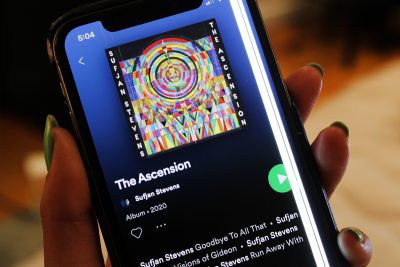Sufjan Stevens has finally returned to form in his new album “The Ascension.” It’s been five years since Stevens has released a formal studio album.

Recently, he’s released a live album, a collaborative album about the solar system, two singles for the “Call Me By Your Name” film soundtrack — one of which received a Grammy nomination — and an ambient-esque album he made with his stepfather.
Stevens has moved far away from the harrowing and extremely personal 2015 album “Carrie and Lowell” to his eighth studio album “The Ascension,” released Friday. Where he ascends to is hard to say, but this definitely is a new Sufjan Stevens.
Stevens, now 45, seems to be in a strange place with this album. He uses a lot of the electronic experimentation that can be found in his 2010 album, “The Age of Adz,” but his songs are largely more aligned with traditional pop music than his previous efforts.
Take singles like “Sugar” and “Video Game”: both sound like they’re going for radio play, but there’s a downbeat melancholy underlying both. These are not anthems to lose your voice singing along to, but they are songs that want to be sadly danced to.
These songs move away from his deeply personal stories found on all of his previous albums. There are no stories about predatory wasps, and no obvious allusions to the death of a loved one. It’s strange to think that the man who made “The Ascension” could make a song like “Decatur, or, Round of Applause for Your Step-Mother!” from his album “Illinois.”
However, that is not to say he has abandoned his deep and poetic lyrics. Songs like “The Ascension” and the stunning opening track “Make Me an Offer I Cannot Refuse” hold some of his best lyrics yet. Perhaps his shift is told in this track with the line “there’s no time for innocence.”
The universality in songs like “Die Happy” and “Tell Me You Love Me” is new for Stevens. His signature specificity is gone — except for the moment he confesses “I s— my pants and wet the bed” — from what is expected of him. Did he give too much in his last albums? The song “Death Star” has techno beats that are made to move to. Maybe he just wanted to make dance music for everyone to enjoy.
Although his lyrics are much more universal on this album, he still has produced an album that is dense and deserves several listens. Tracks like “Ativan,” a slow song about his relationship with anxiety medication, and “Landslide,” a track about creepily pursuing someone he thinks is attractive, are both instantly interesting and complex with interpretations. They speak about vulnerability, but the techno music puts him at a distance.
Stevens is addressing a lot of different figures here. He always seems to be speaking to someone, and never to himself. Many of the songs are addressed to a “love” or a “baby” or a romantic “you,” but he never says who that really is. He’s talking to someone or something new this time.
Stevens is ascending somewhere, but it seems a sad departure. There’s something unholy about his leaving — this is a breakup album if anything. He wants a lover to run away with him, and to be told he’s loved, but by the last couple of songs he has decided that he has to say goodbye to everything he knows.
In the first single and the final track, “America,” Stevens asks to be treated better than how the United States was. He begs, even. He just wants to be loved by what he devoted his whole life to loving.
Sufjan Stevens has gone through many changes. He has found the man who once wanted to write 50 albums about the 50 states but who now can’t even imagine devoting that much time and energy to a torn-apart country.
















































































































